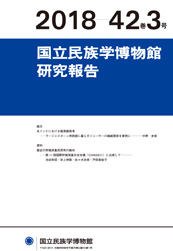Bulletin of the National Museum of Ethnology
Contents
- Articles
- Re-Examining the Bride-Wealth Marriage in North India: A Case Study of Affinal Relationships among the Jogis in Western Rajasthan
Nakano, Ayumi - Research Information
- The Trends of Hunter-Gatherer Studies: Information from the Eleventh International Conference on Hunting and Gathering Societies (CHAGS11)
Ikeya, Kazunobu
Kishigami, Nobuhiro
Sasaki, Shiro
Toda, Mikako
Outline
Articles
Re-Examining the Bride-Wealth Marriage in North India: A Case Study of Affinal Relationships among the Jogis in Western Rajasthan
Nakano, Ayumi
This article presents a re-examination of marriage by bride-wealth marginalized from the view of the Brahmanical ideology in northern India, by particularly addressing marital practices among the Jogis in western Rajasthan. The mode of bride-wealth marriage had been criticized as ‘Asura form’ under the Brahmanical ideology of Kanyādān, which sets bride as a supreme gift to the groom's family. Such a perspective has been commonly accepted by researchers as well. As described herein, we look at the several ethnographic data on the process of the marriage such as engagement negotiation and the bride-wealth among the Jogis, and deliberate the dynamism of the affinal relationship. It indicates that the main practice of bride-wealth called saṃbhāl provides the occasion not only for groom's parents to give bride-wealth but for both parents to cultivate a reliable and friendly relationship between affines (giṇāyat). After the marriage ceremony, their relationship shifts to become entirely balanced and respectful, where no obligation has ever been given. As such, Jogis' mode of constructing the affinal relationship which induces reciprocity as a gift exchange by creating temporary asymmetry and anew generating an equilibriums and a reliable relationship through saṃbhāl. It is based on the different logic from the Brahmanical ‘logic of hierarchy’ associated with denial of reciprocity, which fixes its own value as paramount and others as inferior. We define the Jogis' mode as the ‘logic of equilibrium’.
Key Words:India, Rajasthan, Jogis, affine, bride-wealth, reciprocity
Research Information
The Trends of Hunter-Gatherer Studies: Information from the Eleventh International Conference on Hunting and Gathering Societies (CHAGS11)
Kazunobu Ikeya, Nobuhiro Kishigami, Shiro Sasaki, and Mikako Toda
Key Words:hunter-gatherer, Conference on Hunting and Gathering Societies (CHAGS), Siberia, Arctic regions, Africa
 2018-Vol. 42, No. 3
2018-Vol. 42, No. 3




